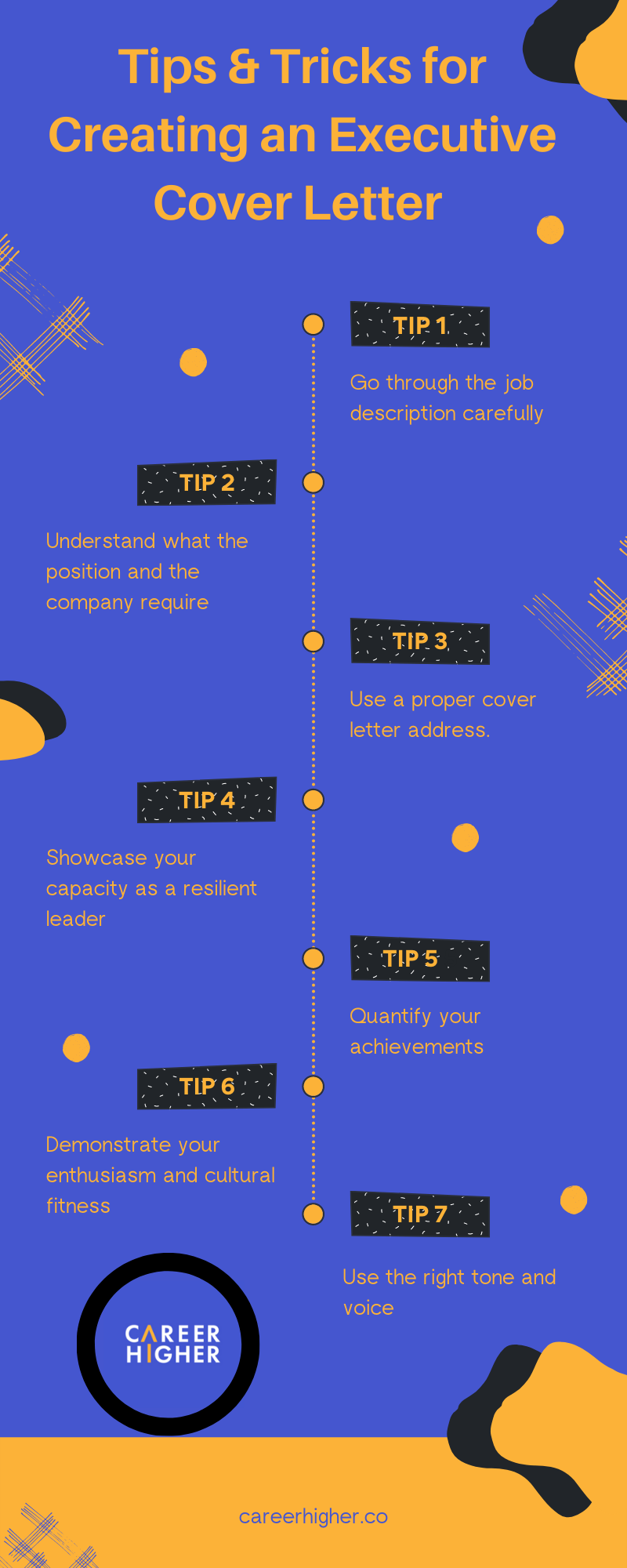Table of Contents
Going for the top position at an organization comes with unique challenges. As such positions play a crucial role in meeting a company’s goals, and executive recruiters and hiring professionals are careful in selecting candidates. Aside from this, competition is stiff. You may be competing against dozens of highly qualified executive applicants with career documents full of notable work accomplishments. So how can you convince an employer that you are the best candidate among them?
The first thing you must remember is a half-baked application won’t lead you to any positive outcomes. Even a well-written resume alone may not be enough. This is where a great cover letter comes in handy. Drafting a persuasive, compelling one can go a long way to making hiring professionals want to learn more about you. So, in this article, we listed some proven effective tips in creating an executive cover letter that can help build a picture of you as the ideal candidate.
1. Analyze the job requirements
As an executive job seeker, the main objective of your cover letter is to prove to hire professionals that you have what it takes to lead the company to success. Hence, every detail of your cover letter must show who you are as a leader and what you can bring to the table. To be able to do this effectively, it is important that you gain a deeper understanding of the job requirements and the company’s specific needs. This way, you can also determine which aspects of your career you can highlight to demonstrate your fitness for the role better.
To understand what the position and the company require, we highly suggest reading the job description carefully. Take note of the critical words and phrases that repeatedly appear throughout the job post. These will serve as keywords you need to add and sprinkle naturally throughout your cover letter. Doing so can help you convince employers that you actually possess what they’re seeking. Hence, you’ll come across as a natural fit for the position you’re applying for.
2. Address your cover letter properly
No matter what level you are at in your career, making a good first impression is one of the most crucial steps during a job search. So, to make your application stand out, addressing your cover letter in an appropriate manner is a must. While, in most cases, you won’t know exactly who will receive and read your cover letter, there are still a variety of ways you can use to greet the recipient appropriately and professionally.
The most effective cover letter address is directly using the contact person’s first name after the salutation “Dear” – for example, “Dear John”. Starting your cover letter this way can help you establish a personal connection instantly in a polite and professional manner without being too formal. Hence, we recommend doing some research to find out the recipient’s specific name. You can search on LinkedIn, check out the company’s website, ask your network or call your target department directly. Yes, this can be time-consuming, but doing it right the first time is definitely worth the extra effort.
If none of your strategies worked, you could use general salutations, such as “Dear Hiring Manager” or “Dear Recruitment Team”. Aside from this, you can consider some information specific to your target position to create more tailored ones. For instance, if you’re applying for a Chief Financial Officer role, you can use “Dear Finance Department Hiring Team” as your salutation. Remember to avoid greetings like “Hello”, “To whom it may concern”, and “Dear Sir/Madam”, as these are too casual, impersonal, and outdated.
3. Showcase your leadership capabilities
Executive job titles signify leadership. So, to convince employers that you are worth considering for an interview, make sure to mention your skillset as a resilient leader. Demonstrate your capacity to lead people through disruptive changes, adapt to challenges, and transform any crisis into a breakthrough to deliver the best outcome possible.
As an applicant for an executive position, we understand that you are likely to have an abundance of skills and qualifications. However, you don’t have to mention all of these in your cover letter. Include only those that are relevant and most aligned with what the position is looking for. To give you a clearer picture of how you can do this in practice, let us see the example below.
“Having served diverse executive roles, I have cultivated my expertise in framing corporate strategy and driving alignment and execution on key initiatives. I take pride in my capacity to build high-performing teams and drive consistent collaboration with the entire C-suite leadership to support the implementation of critical strategic priorities. I capitalize on these competencies to facilitate company turnaround and optimize investment opportunities. I am confident that I will be able to lead your corporate strategy and business development initiatives to foster corporate growth.”
Besides leadership, here are some of the must-have skills of an executive you can highlight in your cover letter.
- Communication and Presentation
- Delegation
- Strategic Planning
- Relationship Building
- Change Management
- Decision-making
- Emotional Intelligence
- Employee Development
- Creativity and Innovation
4. Provide value through your quantitative achievements
A cover letter is indeed a great tool to maximize your chances of getting noticed and landing your desired role. However, outshining a crowded pool of candidates with similar track records is not easy. How can you demonstrate to employers that you can do the job better than everyone else? Well, the simple answer is don’t just tell your accomplishments, show them.
Listing accomplishments is one great way to highlight your strengths and industry expertise. To make it more effective, we highly suggest including a few numbers, such as the specific amount of revenue you generated, how much costs you saved, or how many large-scale deals you closed. Doing so can give employers a clearer picture of the benefits they can receive from you.
However, don’t go overboard by bombarding your cover letter with numbers. We get it! You have a lot of impressive, quantitative achievements, but you don’t have to include each one of them. Be selective and focus on the ones that match the job requirements and are most relatable to employers. Keep in mind that the more your experience aligns with the company’s needs, the higher your chances of being considered for the role. To help you create a compelling narrative of your success story, here is an example you can use as a guide.
“As a Chief Executive Officer (CEO) with ABC Incorporated, I have built the entity from scratch and secured a $200M paid-up capital. My efforts have been integral in boosting the cultural sector’s contribution to the US’s gross domestic product by up to $1.5B annually. Throughout my career, I have uncovered new business development opportunities and accelerated growth plans of various organizations in both the private and public sectors. If hired as your next CEO, I am confident that I will be able to bring the same level of commitment and results to your company.”
5. Tell your story using proper tone and voice
The way you communicate the value you can bring to the table also matters. If you manage to get it right, it can go a long way to showcasing hiring professionals your enthusiasm, genuine interest in the position, and fitness to the company’s culture. Hence, using the proper tone and voice when writing your cover letter is a must.
When conveying your message to employers, it is important to maintain a professional, mature, enthusiastic, and positive tone of voice. This enables you to demonstrate your confidence in your abilities, passion for your work, and eagerness to help the company succeed in all areas without sounding arrogant or desperate to get the job. After all, you wouldn’t want to turn off the employer and lose your chance for the position, right?
Let us also remind you that while it is likewise vital to speak to the company’s culture, avoid copying and pasting information from their website just to look like you’re a great fit. Don’t say anything you don’t mean. Instead, write your cover letter naturally. For example, explain how the company’s values align with your goals. Doing so allows you to sound competent while showcasing your own personal brand.

Tips & Tricks for Creating an Executive Cover Letter
You may have a perfect executive resume that lists all your impressive background and accomplishments. However, submitting your resume alone may not be sufficient to land your dream executive role. Hence, it is crucial to accompany it with a cover letter. Creating a well-crafted one considerably increases your chances of being invited for an interview in a way your resume can’t. So, take advantage of the tips we’ve shared in this article to help you communicate your fitness for the job in the most engaging manner.











